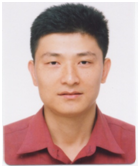He Yunbo, Professor
Faculty of Electro-Mechanical Engineering, Guangdong University of Technology, China
Biography: He Yunbo, male, PhD, Professor of MOE Key Laboratory of Electronic Manufacturing Equipment, Guangdong University of Technology. Research fields: motion control, semiconductor packaging equipment, industrial SCARA robots, automation and machine intelligence. Work experience: 2015 - Now, Professor of Guangdong University of Technology; 2010-2014, Hans Photoelectronic Equipment co. Ltd.; 2002-2010, ASM Technology Singapore; 2000-2002, Post Doctoral Fellow of Nanyang Technological Unviersity Singapore; 2000, Huawei Technologies Ltd.; 1995 - 2000, PhD research, Xi'an Jiaotong Unviersity.
Topic: Intelligent Fine Tuning of Motion Control Systems on High-End Semiconductor Back-end Equipment
Abstract: It’s always difficult to satisfy both strict requirements of dynamic performance and settling performance of high-precision and high-acceleration point-to-point motions on electronic packaging equipment, i.e., Die bonders, Wire bonders, Flip-chip bonders, Wafer bumping machines, and so on. Focusing on this difficulty, Fuzzy logic is promoted in this paper to fine tune feed forward coefficient parameters of motion systems on packaging equipment to satisfy multiple targets of dynamic and settling performance requirements. An intelligent approach is promoted in this paper to fine tune parameters to satisfy multiple targets of dynamic and settling performance requirements. This intelligent fine tuning approach, with achievable multiple motion targets, provides a solution to optimize motion system performance on bonding machines, so as to further improve bonding performance. The idea proposed in this paper helps on development and smooth mass production of semiconductor packaging equipment.
Rey-Chue Hwang, Professor
Electrical Engineering Department, I-Shou University, Taiwan, R.O.C.
Biography: Professor Rey-Chue Hwang received his Ph.D. degree in electrical engineering from Southern Methodist University, Dallas, Texas, U.S.A. in year 1993. Then, he joined the Department of Electrical Engineering, I-Shou University (ISU), Kaohsiung, Taiwan, as a faculty. Currently, he is a full professor.
Professor Hwang has published over 250 papers in various technical journals and conferences in the areas of artificial intelligent system, signal processing and fuzzy control. Throughout his professional career, he had served as the Chairman of Electrical Engineering Department, ISU (08/1996~07/1999), the Director of General Education Center of ISU (08/2007~07/2014), the interim Dean of International College of ISU (08/2011~07/2012), the vice director of general affairs of Chinese Institute of Electrical Engineering, Kaohsiung Division (08/1999~07/2001), the councilor of Chinese Fuzzy Association (02/2004~07/2006), the patent referee of Intellectual Property Office, Taiwan (2005~2007), and the research project referee of National Science Council, Taiwan (2005~present). He is a Fellow of Institution of Engineering and Technology (IET, 2010) and a senior member of Institute of Electrical and Electronics Engineers (IEEE). In year 2004, he chartered IEEE Computational Intelligence Society (CIS) Chapter, Tainan Section and served as the co-chair and chair from year 2004 to year 2009. Furthermore, he has also served the reviewer and the program/technical committee for various international journals and conferences.
Professor Hwang also was the vice president of the General Education Association of Southern Taiwan Colleges (08/2010~07/2013). Currently, he is severing as the Evaluation Committee of the Higher Education Evaluation and Accreditation Council of Taiwan.
Topic: The Novel Indoor Positioning Method by Using Neural Network Technique
Abstract: Indoor positioning system (IPS) has become more and more popular in the object searching due to the rapid developments of wireless communication technique and personal network. IPS is used to provide the location information of person or device. It is a system of location based service (LBS) through the integration of the wireless communication and information services. The object’s accurate position could be determined by using IPS. It has been used widely in the various applications, such as cargo management, patient monitoring, public guiding system, etc. Undoubtedly, IPS will certainly play a significant role for the smart life of human beings in the future. Generally, the structure of IPS could be divided into two parts, i.e. the positioning algorithm and the sensing infrastructure. In this talk, a novel IPS computational algorithm based on neural network will be presented for showing its good positioning ability


